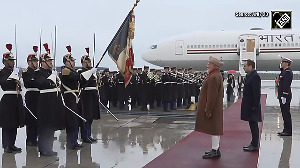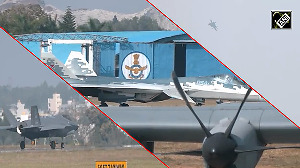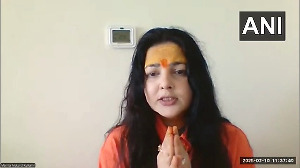The Gujarat police has almost reconstructed how the blasts were planned and executed, though with a few missing links.
The bombs meant for Surat were assembled at Imran Sheikh's home in Baroda, while the bombs for Ahmedabad were assembled in Yunus Mansoori's home in that city's Bapunagar area. Forensic test of these locations is on and the police is hopeful that they will get the necessary evidence soon.
Imran Sheikh's statement gives a lot of information, like how many times Students Islamic Movement of India chief Safdar Nagori and the Azamgarh, Uttar Pradesh-based preacher Mufti Bashir visited Gujarat and stayed in his home and what they did in the state.
"So far, conclusive evidence has not been obtained, but in any terrorism case the turning points in the investigation always come only after the confessional statements of the accused," a senior officer said.
From the alleged accused's confessional statements, which are most likely to be retracted, police sources say they have obtained the entire sequence of the conspiracy. They have the names of shops and witnesses from where the bicycles to plant the bombs were bought, the shops from where the chemicals, timers, wires and detonators were bought. The police has taken care to find some Muslim witnesses in the case as well.
There were three types of bombs: Tiffin bombs, bombs in the shape of a boat and car bombs. All the bombs placed on bicycles exploded at the same time while the car bombs were fitted along with gas cylinders.
The confessional statements also match in detail, the police sources said. They have also recovered a 7.6 mm pistol, a laptop belonging to Iqbal Sheikh and a number of CDs. Usman Agarbattiwala's computer had a rough draft of the e-mail which was sent to the media before the blasts. Agarbattiwala was well-known in his community and his brother is a medical practitioner.
Also, if one believes the Gujarat police, the Students Islamic Movement of India has only become more powerful after its ban in 2001. That means the Intelligence Bureau and state governments have failed to know, assess and analyse the internal changes in the outlawed SIMI.
The investigators say the terror operation in Ahmedabad was planned by Nagori, Mufti Abu Bashir from Uttar Pradesh, Kayamuddin Kapadia of Baroda, Taufique Bilal alias Abdul Subhan Qureshi of Mumbai -- who provided the technical knowhow to make the bombs and to hack computers -- and Sajid Mansuri of Surat, who was the coordinator for the attacks.
The Ahmedabad and Baroda police have gone through the records of lakhs of mobile phones which were discontinued on or after the July 26 blasts. It turned out that the people who have been arrested had switched off their regular mobile phones after the blasts or had thrown away the SIM card. All the arrested accused are members of SIMI; six of them featured on the police list before 2001.
The Gujarat police's interrogation of Zahid Sheikh and Sajid Mansuri suggests that the absconding Taufique alias Abdus Subhan Qureshi possibly had a role in the Mumbai train blasts of July 11, 2006. In the first week of August, a team from the Gujarat police which included a Muslim officer went to Taufique's home in the Nayanagar area of Mira Road outside Mumbai. While serving them seviyan, the traditional sweet dish, Taufique's wife gave enough hints to the police that her husband is unlikely to be caught. She almost threw them a challenge.
Taufique was detained by the Mumbai police after the 2006 blasts, but was released after six days of interrogation because they could not find anything against him.
Zahid Sheikh was also interrogated, but was released. Mufti Bashir was also once interrogated by the Hyderabad police, but was released because they could not find any information about his involvement in any acts of terrorism.
The arrests of the SIMI cadres were not easy. When the Baroda police went to the provision store run by Iqbal Sheikh in the city's Yakubpura area he himself told the police, "Iqbal is not in Baroda."
Iqbal is a new entrant in SIMI's ranks and was not involved in the planning stage of the blasts.
Kayamuddin Kapadia, a member of the orthodox Ahle Hadees sect, is SIMI's head in Gujarat. His whereabouts are not known, but he is as important to this case as Mufti Abu Bashir.
Usman Agarbattiwala, who was arrested in Baroda, gave initial hints of the operation to the Gujarat police. A confidant of Kapadia, Usman was doing a diploma in human rights at Baroda University. The SIMI leadership wants its cadres to penetrate the legal field, media and human rights outfits all over India.
The SIMI training camp organised at the Khumtir dargah in the hilly areas of Pawagadh, Gujarat, was organised by Mufti Bashir and Kapadia.
Sajid Mansuri, who was absconding for the last six years, was picked up after a brilliant operation. Sajid has half a dozen aliases including Saad, Sajjad, Salim and Ghulam Mansoori. All these years he had been hiding in Surat, Baroda or Bharuch. He knows these three cities well.
It is claimed that the accused told the police, "As Gujaratis we wanted to prove that we were capable of doing something in Gujarat. We wanted to teach a lesson to (Gujarat Chief Minister) Modi and his supporters. And we wanted to send across a message by establishing our presence."
The Gujarat police and the state's political leadership are reluctant to admit it, but the blasts were revenge for the 2002 communal riots in the state. But the police claim the attacks were meant to assert SIMI's clout among young Gujarati Muslims.
The investigation of the arrested SIMI cadres is not at all easy. They part with little information; later, they claim that whatever they said are lies. They shift their stance many times a day and thoroughly confuse the police.
Baroda Police Commissioner Rakesh Asthana says, "These are committed people. Imran's old father was treated at the Ahmedabad civil hospital recently. He stayed with him there. But the same man was a part of the conspiracy that planted a bomb in the civil hospital. They have no remorse. They dispute the idea of nationalism."
When Zahid Sheikh, who allegedly planted the bomb in the civil hospital, was produced at the magistrate's court on August 17 he proudly showed the victory sign to television cameras. A police officer says, "Zahid and others think that, at last, now they are on the right track in life as guided by Islam."
Yunus Mansoori allegedly told the Gujarat police that when he asked Mufti Bashir why he want to join the conspiracy, Bashir reportedly asked, 'Jannat sirf aap ko hi jana hai? (only you want to go to heaven?)'
When Bashir was handed over to Himanshu Shukla of the Gujarat police, his first demand was for a green cloth to cover his face instead of the usual black one. He said green is the colour of Islam.
Zahid Sheikh, after his arrest, reportedly told the police, 'We believe in a borderless world. Nationalism breaks the universe. Islam unites. You should convert to Islam.'
Sajjad Mansuri organised the infamous meeting of 124 SIMI workers in Surat's Rajshree hall in 2001 that shocked people by its anti-India speeches. After July 26 the Baroda police learnt that Mansuri was very fond of his children Mohmmad Zaid and Abu Zar. They simply followed these two children to arrest him. Their names were found in a Baroda school, but they left the institution after two years. Their school leaving certificate showed that they had shifted to Bharuch. The police kept watch outside the likely new school, spotted the children, located their address through school records. Mansoori was thus arrested.
He is proving to be a treasure trove of information. Police sources say he is a man of organisation, quite cunning, very commonsensical, and distrusts non-Muslims. He also hates Muslims who worship at dargahs.
Predictably, the police says neither he nor his colleagues have any remorse for what they have done. One accused is so toughened that when the police gives him a tough time he starts reciting verses, ayats, from the Quran.
Although the police officers are very careful in talking about the motives behind the blasts, a source in the police says one accused told him, 'We hate Narendra Modi.'
Yunus Mansoori, Usman Agarbattiwala and Samshuddin Arif have previous records of arrest in a case connected to SIMI activity. Mansoori, who is more than six feet tall, apparently told the police: 'There will be peace in India if everyone converts to Islam.'
When asked repeatedly why these men would stay on in Gujarat after the blasts, one Gujarat police officer says, "None of them thought the police would ever catch them. Even if they are caught they thought it would be for political reasons. Blasts after blasts took place in India and nobody was arrested, so they became brazen."
"The media may like to write what they want on the entire issue of Indian terrorism," he says. "But for us the lesson is simple. A few people in India are interpreting the Quran wrongly and interpreting the concept of jihad crookedly. We have to be careful and alert against them."






 © 2025
© 2025